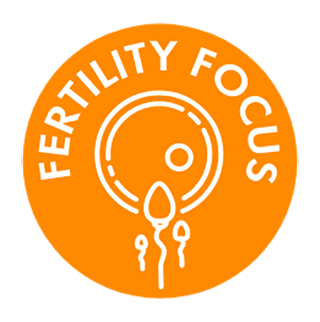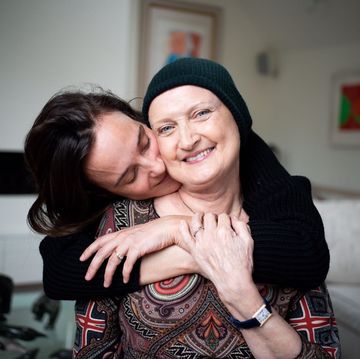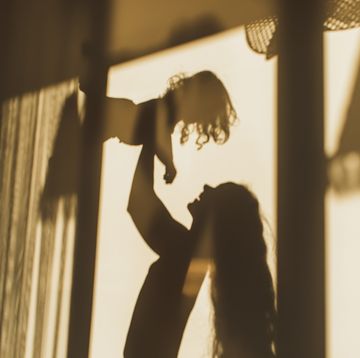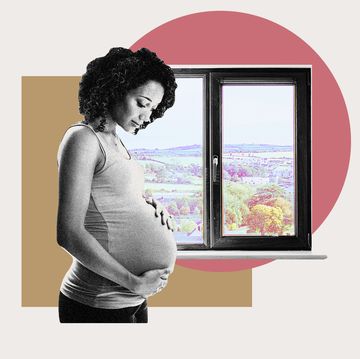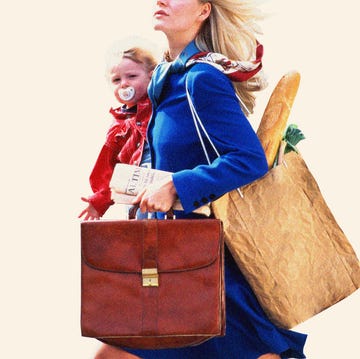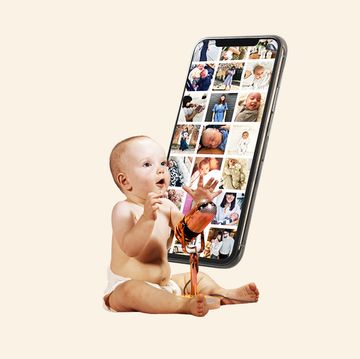Fertility Focus - ELLE explores the myriad experiences and emotions during a person's fertility journey, from surrogacy and miscarriage to hyperfertility and baby loss.
As I ease myself back on the scanning couch, the midwife tilts her screen away from me. Combined with my bleeding, which started the previous day, this gesture feels ominous. Like a hammer hovering above a nail waiting for impact.
My husband, Dan, squeezes my hand. The midwife presses the ultrasound probe down against my lower abdomen. Hard, then harder. Left to right. Right to left. In a few days, I’ll have been pregnant for 12 weeks. There is a long, drawn-out silence before she says: 'I’m so sorry Jennifer, there’s no heartbeat.'
The hammer finds its mark. And something inside me shatters...
I learnt I’d miscarried for the first time five years ago. At the time, I wrote about the experience in a national newspaper as I’d been stunned by how little I knew about miscarriage before it happened to me. Nothing in my personal or professional life had prepared me for it.
I had no idea a miscarriage could be so violent. That there could be so much blood. That the medics who saw me afterwards would be able to offer so little by way of explanation or consolation. They could not tell me why it had happened or whether it would happen again. ‘It’s really common’. ‘It just happens sometimes’. ‘It’s nothing you did.’
Re-entering the world, unceremoniously 'unpregnant', I had no idea what I was supposed to do or say. I didn’t know how much time to take off work – or even if that was something that was allowed. Back then, no one was talking about ‘miscarriage leave’ (as has since been introduced in New Zealand and which some UK MPs are now trying to pass into law here).
I would go on to have three more miscarriages. After each loss, I mistrusted my body a little more, and hoped a little less. Because, even after four miscarriages, two surgeries, countless scans and blood tests – no one could explain why this was happening to us.
We are, I think, speaking about miscarriage a little more openly today. And yet, just as this conversation is getting going I find myself wondering if I should still be joining in. Ironically, just as I start to find it easier to recount the details of my miscarriages, as the immediate trauma has healed and skinned over, there is a voice building in my head, telling me that perhaps it is time for me to stop talking about it.
I don’t know where this pressure comes from. But it makes me wonder whether part of the reason miscarriage has remained taboo for so long is because even when people do tell their stories they eventually feel compelled to stop telling them, too. The same goes for infertility, stillbirth, neonatal death and termination for medical reasons. After all, no one wants to be accused of ‘going on about it’. Or be seen to be revelling in victimhood. But our stories do go on, our experiences continue to be shaped and re-shaped, accruing fresh insight, and taking on new meanings all the time – whether we choose to talk about them or not.
And we are still very far from a complete understanding of what people really go through after pregnancy loss. There is an impression that miscarriage is a short-lived challenge, especially if you do go on to have a child afterwards – as I have done. But there are all kinds of ways it can reverberate, rebounding on you when you least expect it, like any other grief. Recent research has shown that one in six women experience symptoms akin to PTSD after an early pregnancy loss, such as a miscarriage or ectopic pregnancy, for example. Personally, I still find certain dates difficult: Mother’s Day, could-have-been due dates. Pregnancy announcements fill me with secondhand anxiety, even now. Meanwhile, our history of multiple miscarriages looms over our decision – as yet unmade – of whether to try for another child.
These are just some of the parts of the miscarriage story we are un-used to hearing. They will remain unfamiliar if we don’t find ways to keep talking. But there is a cost to this. On top of the fear of ‘going on about it’, it takes emotional energy to tell and re-tell your story. As much as you may not feel the same visceral pain and sadness you once did, you also do not want to live perpetually in the past. But how do you emphasise why this matters without unearthing the worst feelings you’ve had? If you’re not careful, it can burn you out this kind of emotional excavation. Sometimes, it is easier to say nothing at all, than to dredge it up again when a stranger asks, in all innocence, when you plan to give your baby a sibling.
It becomes especially draining when you start to see how you are having to repeat yourself – when you notice how little things have improved for people going through pregnancy loss for the first time now. There are no more answers for those who miscarry today than there were for me five years ago. The care women receive after losing a pregnancy remains patchy, unreassuring, and sometimes downright insensitive. Friends and family still expect people to bounce back quickly, because ‘at least you can get pregnant’.
Cynicism can start to creep in, too. Every time there is a fresh story in the news and someone expresses surprise that pregnancy loss is so very common, or when an official report lays bare how pregnant women are dismissed by healthcare professionals, you wonder how the message is still not getting through. You start to wonder if anything will ever truly improve.
On bad days, it can make you question if it’s even worth saying the same things again and again. There are no easy answers. Sometimes you have to step back, let a fresh batch of headlines or a new awareness campaign pass by without re-sharing what it means to you, so very, very personally. But it’s knowing how badly things need to improve that always pulls me back, that helps me find my voice again. Because, ultimately, I’m not telling this story for sympathy – I’m telling it for change.
Jennie Agg is the journalist behind The Uterus Monologues blog.
The Miscarriage Association offers support to people who have lost a baby. Contact their helpline on 01924 200 799 or email the charity info@miscarriageassociation.org.uk if you have been affected by any of the issues addressed in this article.

